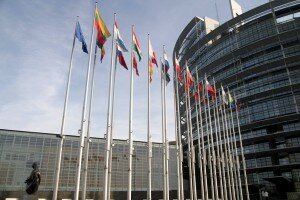“Not very important”
The state of the Union speech of Commission president José Manuel Barroso from nearly two weeks ago states some changes for the future of the European Union. But whose ideas are the President really talking about?
By Liam Gascoigne and Jesper Ernlund Lassen
In times of trouble, or to be more precise, debt trouble that has fatally threatened the existence of the Euro, any words of reassurance are more than welcome. This was likely also the case when the President of the European Commission José Manuel Barroso delivered his State Of The Union speech before the European Parliament on the 28th September. Above all, Greece was at the centre of attention right from the start.
“Greece is and will remain a member of the euro area”, the President of the Commission said, and at the same time demanded that Greece must meet all of their commitments.
The means to meet these commitments could be reforms of the labour market, public finances and pensions, which Barroso also referred to as one of the means to achieve stability within the euro zone.

Commission President José Manuel Barroso held his State of the Union speech before the European Parliament in Strasbourg
Derek Beach Ph.D. of Political Science at the University of Århus, describes it:
”Some of the countries in the euro zone have to do a lot of reforms as Barroso describes. For instance, Greece and Italy have made big loans in German banks and to be capable of paying back this money, they really need to make fundamental reforms. These countries are in the situation that there is no money to pay out pensions for people who retire early. It is most likely this is what Barroso refers to when he says that the countries have to make reforms.”
As another mean to alter the faith of the euro, the President of the Commission suggested the so called financial transaction tax, better known as the Tobin tax, named after the deceased economist James Tobin. Barroso said that it is only fair that the financial sector should contribute to society when all other sectors do and at the same time received applause, at least from the European socialists group in the European Parliament.
It is funny that a Commission President that is renown for his new liberalistic reign of the commission is now suggesting this taxation. But perhaps it isn’t so funny after all.
“Actually, it is not a commission proposal but a French proposal that the commission has adopted. It must be seen in the context that nothing really happens in the EU without Germany and France being in favour of it. Therefore it is natural for the Commission to take the suggestion up.”, says Derek Beach.
Barroso also suggested Eurobonds, although it would require a treaty change to implement these in the euro zone. It would mean that there would only be one kind of bond in the euro zone at a common interest rate. This would be a great benefit for Greece, Italy and other countries in similar situations, but would be a costly affair for countries with a healthy economy like Germany. Therefore it is no wonder that the German chancellor, Angela Merkel, strongly resists the implementation of Eurobonds.
However, the speech of the union may not be that important, after all.
“The commission has de facto been weak ever since Germany and France broke the European Stability and Growth pact in 2002 and 2003 with the commission not capable of doing anything against it.” said Derek Beach.
This also leads to the question – How important is the state of the union speech?
To this, Derek Beach has a very clear opinion.
“It is not very important, especially not if you compare it to the American President’s state of the union speech, and the content of the current speech of José Manuel Barroso is also not very important”, states the American scientist living in Europe.